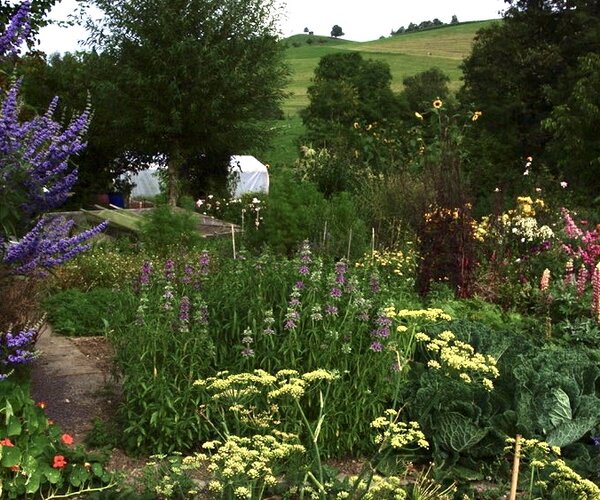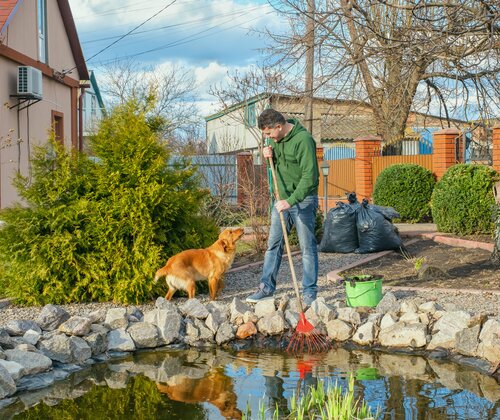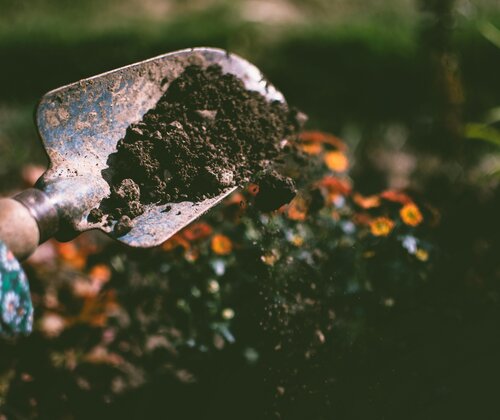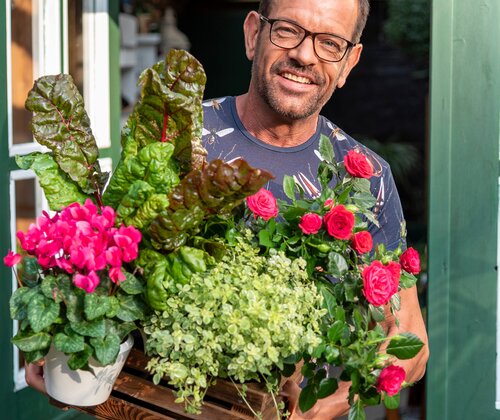
‘Growth-proof’ future with Effective Microorganisms
By Susanne Schütz and Anne Lorch
When we dream up visions, we discover completely new facets and possibilities. They give us the strength to abandon established and proven habits. Even seemingly absurd fantasies about the future motivate us and help us to create new guidelines and behaviours, even though they seem to completely contradict the current zeitgeist.

When the Japanese horticulture professor Teruo Higa had the vision of developing purely organic plant aids based on microorganisms and without harmful additives a good 40 years ago, it was dismissed as a crazy idea. Since then, attentive EM users have observed the all-round positive changes in almost all areas - be it in the garden, in agriculture, in water, in industry, in humans, pets and farm animals. In the meantime, many different products have been developed for the most diverse areas of our living environment. After a good 20 years of EM practice, one might think that the many possibilities of EM have been exhausted. However, new ideas are still emerging.
When the Japanese horticulture professor Teruo Higa had the vision of developing purely organic plant aids based on microorganisms and without harmful additives a good 40 years ago, it was dismissed as a crazy idea. Since then, attentive EM users have observed the all-round positive changes in almost all areas - be it in the garden, in agriculture, in water, in industry, in humans, pets and farm animals. In the meantime, many different products have been developed for the most diverse areas of our living environment. After a good 20 years of EM practice, one might think that the many possibilities of EM have been exhausted. However, new ideas are still emerging.
Counterparts on the economic stage are acting strong
Although EM has arrived in all parts of the world, it is still ridiculed or rejected by certain influential circles. As a result, all kinds of toxic substances are still authorised by law, which pollute all living things for a long time. Manufacturers in this field are literally on the ropes and are frantically producing even more obscure aids to stop the oxidative, rust-inducing processes on our planet so that it can continue to turn.
What promises a viable future?
The globe is our home, our livelihood. Where will we go if our planet continues to be greedily exploited and destroyed? Mahatma Ghandi once said: ‘The future is based on what we do today’. Our posterity will show whether the resistance against the short-sighted industries can prevail. We know how difficult it is to leave the beaten track, because the power of habit is a strong fortress.

The proportion of a reflective society is growing
The will to make everyday life and the environment more life-friendly is becoming increasingly clear. The necessary dominance (the ‘tipping point’) seems to be approaching. One of the great visions is that the use of Effective Microorganisms will become a matter of course and will circumnavigate the world with wide-ranging, comprehensive applications so that the recovery of our planet can take place on many vital levels. It gives us the certainty that many things will return to natural processes. Time is of the essence, but working with EM will quickly show whether the deal with Effective Microorganisms delivers what it promises and whether it serves and benefits us and everything.
From Susanne's wealth of experience
‘It can't get any better than good,’ course participants often say, and why does Susanne still use EM everywhere? Her answer: ‘That's right. But the air pollution? Apart from rare Saharan dust, many pollutants are constantly raining down. It should be clear to everyone that we can only maintain soil health and everything around it with constructive microorganisms, so that oxidising processes have no chance. With EM technology, we have been entrusted with a beneficial tool.’
After hundreds of courses, Susanne has a folder full of positive feedback on how quickly soil and plant health has improved in her garden.
Susanne's conclusion: ‘Resignation is a thing of the past, we are creating oases for the future!’
From Susanne's wealth of experience
‘It can't get any better than good,’ course participants often say, and why does Susanne still use EM everywhere? Her answer: ‘That's right. But the air pollution? Apart from rare Saharan dust, many pollutants are constantly raining down. It should be clear to everyone that we can only maintain soil health and everything around it with constructive microorganisms, so that oxidising processes have no chance. With EM technology, we have been entrusted with a beneficial tool.’
After hundreds of courses, Susanne has a folder full of positive feedback on how quickly soil and plant health has improved in her garden.
Susanne's conclusion: ‘Resignation is a thing of the past, we are creating oases for the future!’
01 Leeks contain many minerals such as calcium, magnesium and iron. It has a diuretic and healing effect on arthritis, gout and kidney disease. A daily leek salad helps with diabetes and inhibits cancer cells.
02 Susanne has been propagating old, seed-resistant vegetable varieties herself for years. In the case of runner beans, she leaves the first ripening pods hanging on the stalk until they are completely dry. These seeds guarantee healthy, strong offspring.
03 The cabbage's beautiful collar of leaves adorns the vegetable patch. All types of cabbage lower high blood pressure, heal stomach ulcers and prevent malignant tumours. The high calcium content is better absorbed by the body than milk. Provitamin A supports health. Leaves used as a poultice help with external swollen injuries. So please grow more cabbage in the vegetable garden.
04 The blue monk's pepper developed particularly splendidly with EM care. Its peppery-tasting seeds are used in natural medicine as an uplifting stimulant for mood swings, among other things.
‘It can't get any better than good,’ course participants often say, and why does Susanne still use EM everywhere? Her answer: ‘That's right. But the air pollution? Apart from rare Saharan dust, many pollutants are constantly raining down. It should be clear to everyone that we can only maintain soil health and everything around it with constructive microorganisms, so that oxidising processes have no chance. With EM technology, we have been entrusted with a beneficial tool.’
After hundreds of courses, Susanne has a folder full of positive feedback on how quickly soil and plant health has improved in her garden.
Susanne's conclusion: ‘Resignation is a thing of the past, we are creating oases for the future!’
01 Leeks contain many minerals such as calcium, magnesium and iron. It has a diuretic and healing effect on arthritis, gout and kidney disease. A daily leek salad helps with diabetes and inhibits cancer cells.
02 Susanne has been propagating old, seed-resistant vegetable varieties herself for years. In the case of runner beans, she leaves the first ripening pods hanging on the stalk until they are completely dry. These seeds guarantee healthy, strong offspring.
03 The cabbage's beautiful collar of leaves adorns the vegetable patch. All types of cabbage lower high blood pressure, heal stomach ulcers and prevent malignant tumours. The high calcium content is better absorbed by the body than milk. Provitamin A supports health. Leaves used as a poultice help with external swollen injuries. So please grow more cabbage in the vegetable garden.
04 The blue monk's pepper developed particularly splendidly with EM care. Its peppery-tasting seeds are used in natural medicine as an uplifting stimulant for mood swings, among other things.

To maintain the beauty and natural clarity of a pond, nature is often your best ally! Without using any chemicals, you can create a healthy balance in the pond that not only improves the water quality, but also promotes a natural habitat for animals and plants. Multikraft expert Barbara Enengel shares her tips on pond care with you.

Soil is the basis of all horticultural work. It is more than just the soil beneath our feet - it is a living ecosystem that forms the basis for the growth of healthy plants. On a small and large scale, in the garden and in the field. Here you can find out how to determine the type of soil in your garden, what humus is all about and how you can increase the humus content in your soil with the help of simple measures.

